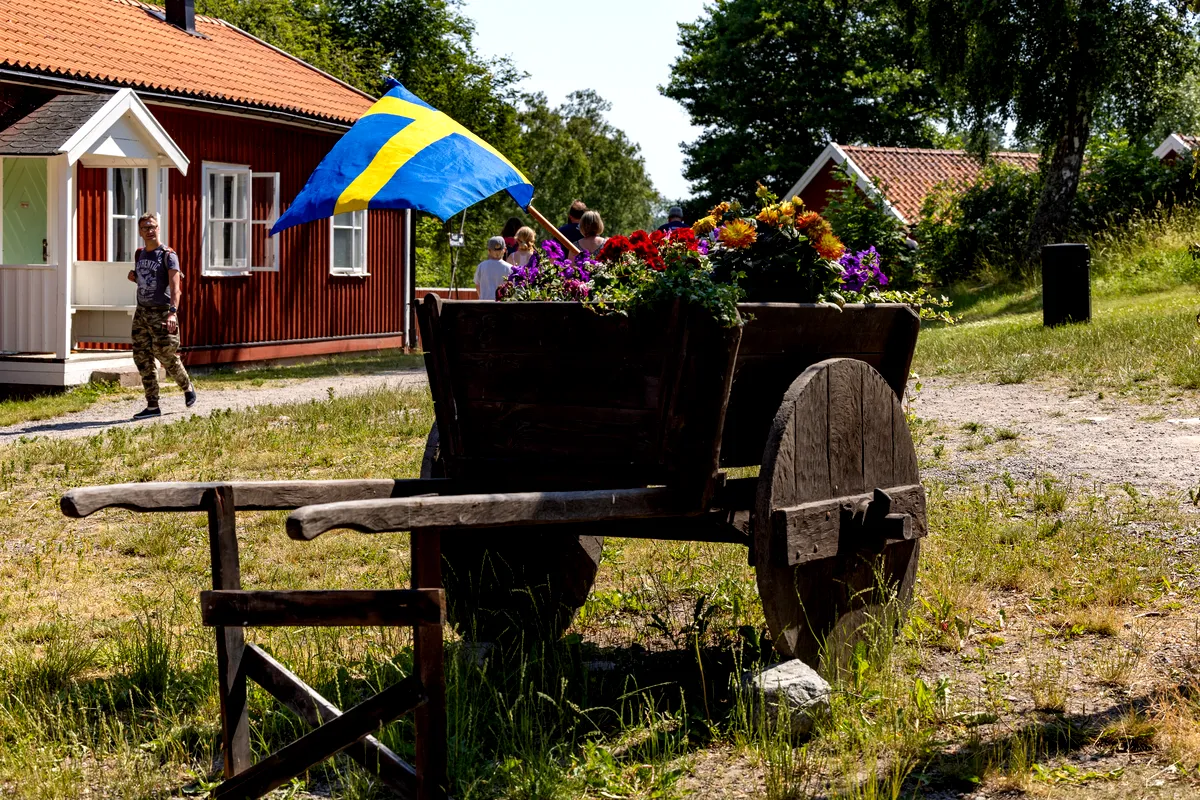Birka, often referred to as the oldest town in Sweden, is a site of immense historical significance. Located on the island of Björkö in Lake Mälaren, just west of Stockholm, this ancient Viking city offers a fascinating glimpse into the life of the Vikings in Sweden. Founded in the 8th century, Birka was a thriving trading hub, strategically positioned at the crossroads of various trade routes connecting Scandinavia with the rest of Europe and beyond.
Visiting Birka is like stepping back in time to the era when Vikings in Sweden dominated the northern seas. The site is rich in history, archaeology, and culture, making it a must-visit for anyone interested in Swedish Viking history. In this article, we’ll take you on a journey through Birka’s history, its significance as a Viking trading post, and what you can expect when you visit this remarkable Viking town.
The Historical Significance of Birka
Birka: The Oldest Town in Sweden
Birka holds the title of the oldest city in Sweden, a testament to its importance in the Viking Age. Established around 750 AD, Birka was not just a settlement but a bustling Viking city. It was one of the first urban centers in Sweden, playing a crucial role in the country’s development during the Viking Age. The meaning of Birka has been the subject of various interpretations, but it is generally accepted that it was a place of trade and commerce, where merchants from all over Europe and the East would come to exchange goods.

A Thriving Viking Trading Hub
As a Viking place of immense importance, Birka was strategically located on Björkö, an island that allowed easy access to both the Baltic Sea and the inland trade routes. This made Birka a crucial link between the Norse world and the rest of Europe. The city was a bustling market where furs, iron, and other Scandinavian goods were traded for silver, glass, and other luxury items from the East and the Mediterranean.
Birka Sweden was not just a trading post; it was a melting pot of cultures, with traders from all over the known world. This diversity is reflected in the archaeological finds from the site, which include artifacts from as far away as the Middle East and the Byzantine Empire.
The Viking Village of Birka
Birka is often referred to as a Viking village, but it was much more than that. It was a fortified city with a population of around 700-1,000 people, including merchants, craftsmen, and warriors. The city was laid out in a grid pattern, with streets, workshops, and residential areas clearly defined. This level of urban planning is a testament to the sophistication of Vikings from Sweden during this period.
Today, visitors to Birka can explore the reconstructed Viking village Sweden, which provides a glimpse into what life was like in the city over a thousand years ago. The reconstructed houses, workshops, and fortifications offer a tangible connection to the past, allowing visitors to experience the sights and sounds of a Norse city.

Visiting Birka: What to Expect
Birka Stockholm: A Journey Through Time
Getting to Birka from Stockholm is an adventure in itself. The island of Björkö is accessible by boat, with regular departures from central Stockholm during the summer months. The journey takes you through the scenic waters of Lake Mälaren, offering stunning views of the Swedish countryside.
Once on the island, visitors can explore the Birka museum, which houses a vast collection of artifacts excavated from the site. The museum provides a comprehensive overview of Birka’s history, with exhibits on the city’s trade, daily life, and its eventual decline.
Archaeological Sites and Viking Graves
One of the highlights of a visit to Birka is the opportunity to explore the many viking archaeology sites scattered across the island. These include the remains of the city’s fortifications, workshops, and residential areas, as well as the famous Viking graves. The burial mounds of Birka are among the most significant in Sweden, offering valuable insights into Sweden Vikings history.
The graves vary in size and complexity, reflecting the social status of the individuals buried there. Some of the most elaborate graves belong to Viking chieftains and warriors, complete with weapons, jewelry, and other grave goods. These viking sites in Sweden are a poignant reminder of the people who once lived and died in Birka.

The Decline of Birka
Despite its importance during the Viking Age, Birka’s prominence began to wane in the late 10th century. The reasons for this decline are still debated by historians, but it is generally believed that the rise of other trading centers, such as Sigtuna, and the changing political landscape in Scandinavia played a role. By the 11th century, Birka was abandoned, and its once-thriving markets fell silent.
Today, Birka stands as a silent witness to the past, a place where the echoes of the Viking Age can still be heard. For anyone interested in swedish vikings history, a visit to Birka is a journey into the heart of Sweden’s Viking heritage.
Frequently Asked Questions
What is the meaning of Birka?
Birka is believed to have been a term used to describe a market or a trading post. Its exact meaning has been debated, but it generally refers to a place where merchants would gather to trade goods.
What religion is Birka?
During its heyday, Birka was primarily pagan, like much of Viking Scandinavia. However, it was also a place of religious transition, with early Christian missionaries, such as St. Ansgar, arriving in the 9th century to spread Christianity.
Why did the Vikings leave Birka?
The decline of Birka is attributed to several factors, including the rise of other trading centers like Sigtuna, changes in trade routes, and possibly political shifts in the region. By the 11th century, Birka was abandoned.
Is Birka worth it?
Absolutely! Birka offers a unique and immersive experience into the Viking Age. With its rich history, well-preserved archaeological sites, and scenic location, it’s a must-visit for anyone interested in Viking history.
Practical Information for Visitors
How to Get to Birka
Birka is located on Björkö island, about 30 kilometers west of Stockholm. The easiest way to reach Birka is by boat, with several tour operators offering trips from Stockholm during the summer months. The boat ride takes approximately two hours each way, making it a perfect day trip.
Exploring the Island
Once on Björkö, you can explore the island on foot. The main attractions, including the Viking village and the archaeological sites, are within walking distance of the harbor. Guided tours are available and highly recommended, as they provide valuable insights into the history and significance of the site.
Entrance Fees and Opening Hours
The Birka museum and archaeological sites are open to visitors from May to September. The entrance fee includes access to the museum, the reconstructed Viking village, and the archaeological sites. For the most up-to-date information on ticket prices and opening hours, it’s advisable to check with the tour operators or the official Birka website.
Where to Stay
While Birka itself does not offer accommodation, there are several options in nearby Stockholm. For those looking to explore more of the region, renting a campervan in Stockholm is a great option, allowing you to combine your visit to Birka with other attractions in the area.
Birka is more than just a historical site; it’s a journey into the heart of Viking Sweden. Whether you’re a history buff, an archaeology enthusiast, or simply someone looking to explore the rich cultural heritage of Sweden, a visit to Birka is an unforgettable experience. From the viking archaeology sites to the reconstructed Viking village, Birka offers a unique glimpse into the past, bringing the Viking Age to life in a way that few other places can.
If you’re planning a trip to Stockholm, be sure to include Birka in your itinerary. And for those who want to explore the region at their own pace, consider renting a campervan in Stockholm for the ultimate Scandinavian adventure.


 By
By








